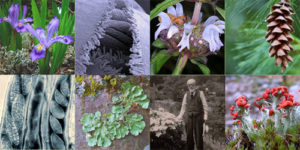 Dr. L. Alan Prather, Director
Dr. L. Alan Prather, Director
Phone: (517) 355-4695 — Email: alan@msu.edu
Dr. Alan M. Fryday, Collections Manager
Phone: (517) 355-4696 — Email: fryday@msu.edu
MSU Herbarium, Department of Plant Biology, 166 Plant Biology Building, East Lansing, MI 48824-1312
Phone: (517) 355-4696
Access/availability: Open to the public weekdays 8am -5pm. Groups should contact the herbarium to arrange a visit.
The Michigan State University Herbarium represents a worldwide collection of dried, preserved plants and lichenized and non-lichenized fungi. Current holdings number over 500,000 specimens, with approximately 315,000 specimens of vascular plants, 115,000 lichenized fungi, 35,000 non-lichenized fungi, and 20,000 bryophyte specimens. Over 1,800 type specimens are represented. The collection is used locally, nationally and internationally by researchers and students working on systematic, evolutionary and ecological questions. Specimens are used in a service role to provide identifications for suspected plant poisoning cases, to aid in the identification of agricultural pests and to answer questions for local botanical enthusiasts.
The Vascular Plant collection is the oldest in the state, containing many specimens of historical importance. Nearly one-third of the collection was amassed by Dr. W.J. Beal during his 40 year tenure at MSU. The collection is especially strong in collections from the Great Lakes region as well as Mexico and SE Asia (Borneo). The lichen collection is of international importance because of its extensive collections from the Caribbean Islands and from oceanic island groups of the Southern Hemisphere (Juan Fernandez, Falkland Islands, Iles Kerguelen, New Zealand Shelf Islands). It was assembled largely by Dr. Henry A. Imshaug (curator of the Cryptogamic Herbarium from 1958 to 1990) and his graduate students, who included I. M. Brodo, R. C. Harris & C. M. Wetmore.
More details of the collection can be found on the herbarium web-site
Affiliation: Part of the Plant Biology Department
